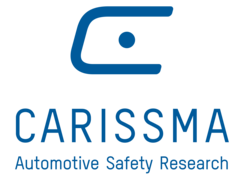thireks is the name of the young deep-tech company that Dr Pascal Brunner founded together with Florian Denk (CTO), Dr Ronald Kates (CSO), Professor Werner Huber (CMO), and Felix Fröhling (Developer). The five combine decades of research experience with modern simulation technology, and develop a system that can assess road safety more realistically than many conventional models. The decisive difference: thireks also models human error - carelessness, delayed reactions, evasive manoeuvres. In other words, precisely those moments when things become critical. Brunner: "We wanted to show what happens when people don't function perfectly - and what that means for planning." The team came together in a research project led by Werner Huber. At the same time, Brunner completed his doctorate at the Technical University of Munich under Professor Klaus Bogenberger and developed methods in his dissertation to make human behaviour in road traffic statistically tangible. This led to a simulation-based framework that cities, manufacturers, and transport planners can use to test the safety of measures, technologies, or new mobility concepts - even before they are implemented. This is a fundamental issue about automated driving: From automation level 3, it is no longer the human being who is liable, but the manufacturer. The requirements are correspondingly high, as is the need for reliable scenarios. This is exactly where thireks comes in. The simulations can be docked onto existing models or newly developed for specific issues - for example, to evaluate urban infrastructure, e-scooters, or new driver assistance systems. The founding team was supported by THI's Start-up Centre, which helped with the business plan, market analysis, and network development. "That was extremely helpful. We were able to tailor our offering much more specifically to potential partners," says Brunner. The fact that he founded a company at all is statistically rather unusual. According to the Student Entrepreneurship Monitor 2025, one in five students can imagine starting their own business. But only very few do—the reason: lack of time, lack of knowledge, lack of role models. According to the report, the topic is still taught too rarely at universities - just 17 per cent of students interested in starting their own business had start-up education at school, and only 15 per cent cite lecturers as role models. Brunner is now one. Not loudly, not with fanfare - but with attitude, perseverance, and a good idea at the right time. "Was the foundation worth it? Definitely," he says. "It's a special moment when a research topic becomes a product that brings real benefits." And then he adds a sentence that summarises pretty well what it's all about: “Putting science into practice - that's what motivates us most at thireks.” |


![[Translate to English:] Logo Akkreditierungsrat: Systemakkreditiert](/fileadmin/_processed_/2/8/csm_AR-Siegel_Systemakkreditierung_bc4ea3377d.webp)








![[Translate to English:] Logo IHK Ausbildungsbetrieb 2023](/fileadmin/_processed_/6/0/csm_IHK_Ausbildungsbetrieb_digital_2023_6850f47537.webp)


